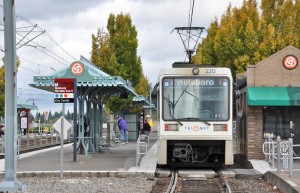 With the failure of C-Trans Prop 1, Washington Policy Center issued a press release yesterday that included results of a poll that was conducted recently. The premise for the poll was the suspicion that citizens of Clark County Washington were against light rail and that public official were lining up to promote it despite public feels and opinions.
With the failure of C-Trans Prop 1, Washington Policy Center issued a press release yesterday that included results of a poll that was conducted recently. The premise for the poll was the suspicion that citizens of Clark County Washington were against light rail and that public official were lining up to promote it despite public feels and opinions.| FOR IMMEDIATE RELEASE
November 7, 2012
|
Contact: John Barnes
206-999-9908
|
|
| Election Results and Recent Polling Show
Clark County Area Voters Do Not Support Light Rail
VANCOUVER – Voters in the Clark County area are soundly rejecting (56.3%) a proposal to fund light rail across a new Columbia River Crossing (CRC) on I-5. The measure, Proposition 1, was placed on the ballot by the Clark County Area Transit Authority, C-TRAN. Yet, even though this is the second time voters have rejected light rail in Clark County, local officials have made it clear they want to move ahead with extending light rail from Portland to Vancouver.
Recent polling, however, shows voters do not support light rail across the CRC and 57% oppose ANY taxes or fees to pay for it. 87% of voters also strongly believe they should have the chance to vote on the project.
Conducted in October, Washington Policy Center’s poll found the following:
1. Which do you think is the most cost-effective public transit between Vancouver and Portland?
2. Do you support or oppose raising the sales tax for a new light rail system from Vancouver to Portland? IF SUPPORT/OPPOSE: Is that strongly support/oppose or somewhat support/oppose?
3. Do you support or oppose any type of tax or fee to pay for light rail from Vancouver to Portland? IF SUPPORT/OPPOSE: Is that strongly support/oppose or somewhat support/oppose?
4. Should taxpayers in Washington State have the opportunity to vote on whether to extend Portland’s light rail system to Vancouver, or not?
“Voters have made it crystal clear they don’t want light rail in the Clark County area,” said Michael Ennis, transportation director at Washington Policy Center. “Voters are promoting anti-rail candidates to public offices and twice rejected light rail proposals at the ballot. Instead of pushing billion-dollar rail schemes that the public does not want, officials should focus on improving transit that actually moves the most people for the least cost.”
Michael will be speaking about this issue at a Small Business Forum hosted by Washington Policy Center and the Camas-Washougal Chamber of Commerce on November 15. The lunch event will take place at the Camas Meadows Golf Club from noon – 1:30pm.
Washington Policy Center is an independent public policy research organization in Washington state. Transportation director Michael Ennis has conducted extensive research on the cost and performance of light rail. For more information visit www.washingtonpolicy.org.
|
||
| ###
Washington Policy Center
Improving lives through market solutions
Seattle · Olympia · Spokane · Tri-Cities
www.washingtonpolicy.org | www.WashingtonVotes.org | www.washingtonpolicyblog.org |
||










